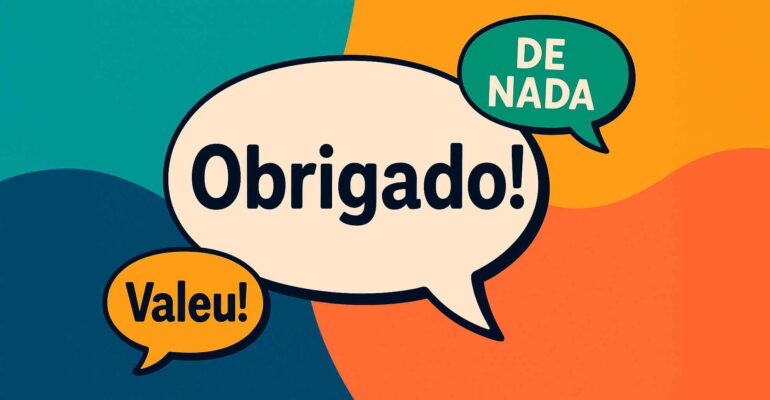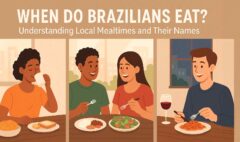How to Say Thank You in Portuguese
How to Say Thank You in Portuguese
Introduction to Portuguese Expressions of Gratitude
Ever landed in a new country and felt awkward not knowing how to say a simple “thank you”? If you’re headed to Brazil or Portugal, you’ll want to master this essential expression of politeness. Gratitude is a big deal in Portuguese-speaking countries, and knowing how to express it goes a long way.
Why Learning to Say “Thank You” Matters
It’s not just about manners—it’s about connection. A heartfelt “thank you” can make interactions smoother, open doors, and help you blend in more easily with locals.
Cultural Importance of Gratitude in Brazil and Portugal
In both Brazilian and European Portuguese cultures, expressing gratitude is a sign of respect and warmth. Whether you’re receiving a favor or buying something at a market, not saying “thank you” can come off as rude.
The Most Common Way to Say Thank You in Portuguese
“Obrigado” or “Obrigada” is the go-to phrase. But wait—why are there two versions?
“Obrigado” vs. “Obrigada”
Simple: it depends on the speaker’s gender.
-
A man says: Obrigado
-
A woman says: Obrigada
It literally means “obliged,” like saying “much obliged” in old-fashioned English.
Gender and Grammar Rules
The rule is based on the speaker, not the person being thanked. So even if you’re thanking a woman, if you are a man, you still say “obrigado.”
Formal and Informal Ways to Say Thank You
Like many languages, Portuguese shifts between formal and casual depending on the setting.
When to Use Each Form
-
Use “obrigado/obrigada” in most situations—both formal and casual.
-
Use “muito obrigado/a” when you really want to show extra appreciation.
-
Use “valeu” with friends.
Examples of Formal Situations
-
Thanking your boss: “Muito obrigado, senhor.”
-
In a business email: “Agradeço pela atenção.”
Alternative Ways to Express Gratitude
Let’s level up your Portuguese thank-you game.
“Muito obrigado/obrigada” – Thank you very much
Just add “muito” before “obrigado/a” for emphasis. Super versatile.
“Valeu” – Thanks (slang)
Used mainly in Brazil. It’s casual and friendly—great for chatting with peers.
“Agradecido/a” – Grateful (literary/formal)
You might hear this in speeches or older expressions:
“Fico agradecido pela ajuda.” = I’m grateful for the help.
Responding to Thank You in Portuguese
Knowing how to say thank you is only half the story—what about replies?
“De nada” – You’re welcome
The standard, safe response in all situations.
Other Common Replies
-
“Imagina” – “No worries” (Brazilian)
-
“Não há de quê” – “Don’t mention it” (more traditional)
-
“Disponha” – “At your service” (very formal)
Regional Variations in Saying Thank You
Brazilian Portuguese vs. European Portuguese
In Portugal, people might say “obrigadinho/a” (a cute, affectionate version), which is less common in Brazil.
Expressions Unique to Certain Regions
-
In Bahia (Brazil), you might hear: “Axé!” – a word of blessing and gratitude rooted in Afro-Brazilian culture.
-
In Portugal, you might hear “Bem haja!”, especially in rural or older generations.
Common Mistakes to Avoid
Using the Wrong Gender
This is the #1 beginner slip-up. If you’re a woman, don’t say “obrigado”—go with “obrigada.”
Overusing Informal Language
Don’t drop “valeu” in a job interview. Always match your tone to the context.
Thank You in Different Contexts
In Shops and Restaurants
-
Client: “Obrigada!”
-
Cashier: “De nada. Volte sempre!”
At Work or School
-
“Obrigado pela ajuda com o relatório.”
-
“Agradeço sua explicação.”
In Romantic or Family Settings
-
“Obrigada, amor.”
-
“Muito obrigado, mãe.”
Teaching Kids and Beginners to Say Thank You
Start simple with repetition and clear context. Use songs, role-play, and cartoons to reinforce “obrigado/a” and “de nada.”
Idioms and Proverbs About Gratitude in Portuguese
-
“A gratidão é a memória do coração.”
Translation: “Gratitude is the memory of the heart.” -
“Quem não agradece, não merece.”
Translation: “He who doesn’t give thanks doesn’t deserve it.”
Gratitude in Portuguese-Speaking Cultures
Religious and Festive Uses
In Brazil, you might hear people thank God more than each other:
“Graças a Deus!” – “Thanks be to God!”
Gratitude is also a core theme during celebrations like Festa Junina and Christmas.
How to Practice and Remember These Phrases
Flashcards, Apps, Real Conversations
-
Use apps like Duolingo or Memrise.
-
Write thank-you notes in Portuguese.
-
Practice with native speakers or language exchange buddies.
Summary of Key Phrases
| Portuguese | English |
|---|---|
| Obrigado / Obrigada | Thank you |
| Muito obrigado / obrigada | Thank you very much |
| Valeu | Thanks (slang) |
| De nada | You’re welcome |
| Imagina / Disponha | No problem / Anytime |
Final Thoughts on Showing Gratitude in Portuguese
Learning how to say “thank you” in Portuguese isn’t just about words—it’s about embracing a culture that values kindness and connection. Whether you’re chatting with friends in Rio or buying pastries in Lisbon, a well-placed “obrigado” can open hearts and doors. So don’t just memorize the words—feel them.
Learn Portuguese the Brazilian Way! 🇧🇷✨
At The Brazilian Ways, we believe language learning should be fun, immersive, and deeply connected to culture. Our unique courses help you speak Portuguese naturally while experiencing Brazil through its music, films, literature, and dance.
🎶 The Brazilian Music Club – Learn Portuguese through the rhythm and lyrics of Brazilian music.
🎬 The Movie Club – Improve your Portuguese while exploring the best of Brazilian cinema.
📖 The Short Story Club – Enhance your skills by diving into Brazilian literature.
💃 Portuguese for Zouk – Connect with the Zouk dance community while learning Portuguese.
✨ Join a vibrant community of learners and experience Brazil through language! 👉 Explore our programs and start today! 🚀
📲 Follow us on Instagram for more engaging content, language tips, and cultural insights: @thebrazilianways
FAQs
1. What’s the difference between “obrigado” and “obrigada”?
“Obrigado” is said by males, “obrigada” by females. It depends on the speaker’s gender.
2. Is “valeu” appropriate for formal situations?
No, “valeu” is casual and should be used among friends or in relaxed settings.
3. Can I just say “muito obrigado” every time?
Yes, it works in most cases and shows extra politeness, but use “valeu” with friends for a more natural vibe.
4. How do I pronounce “obrigado”?
In Brazil: “oh-bree-GAH-doo” (with a soft ‘r’)
In Portugal: “oo-bree-GAH-doo” (with a rolling ‘r’)
5. How do I thank someone in writing in Portuguese?
Try: “Agradeço pela atenção” (formal) or “Obrigado pela ajuda” (informal).















